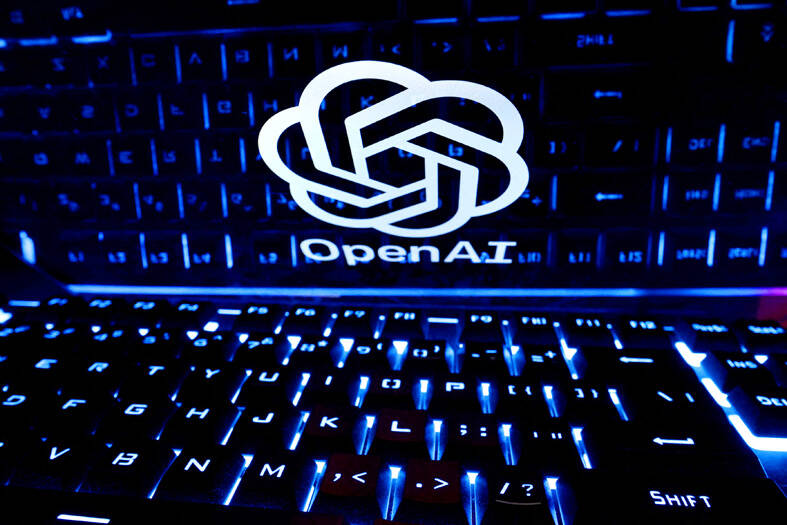ChatGPT-maker OpenAI is getting into the voice assistant business and showing off new technology that can clone a person’s voice, but says it would not yet release it publicly due to safety concerns.
The artificial intelligence (AI) company on Friday unveiled its new Voice Engine technology, just more than a week after filing a trademark application for the name. The company claims that it can recreate a person’s voice with just 15 seconds of recording of that person talking.
OpenAI said it plans to preview it with early testers, “but not widely release this technology at this time” because of the dangers of misuse.

Photo: Reuters
“We recognize that generating speech that resembles people’s voices has serious risks, which are especially top of mind in an election year,” the San Francisco-based company said in a statement.
In New Hampshire, authorities are investigating robocalls sent to thousands of voters just before the presidential primary that featured an AI-generated voice mimicking US President Joe Biden.
A number of start-ups already sell voice-cloning technology, some of which are accessible to the public or for select business customers such as entertainment studios.
OpenAI said its early Voice Engine testers have agreed to not impersonate a person without their consent and to disclose that the voices are AI-generated.
The company, best known for its chatbot and the image-generator DALL-E, took a similar approach in announcing, but not widely releasing, its video-generator Sora.
However, a trademark application filed on March 19 shows that OpenAI likely aims to get into the business of speech recognition and digital voice assistant. Eventually, improving such technology could help OpenAI compete with the likes of voice products such as Amazon.com Inc’s Alexa.

BYPASSING CHINA TARIFFS: In the first five months of this year, Foxconn sent US$4.4bn of iPhones to the US from India, compared with US$3.7bn in the whole of last year Nearly all the iPhones exported by Foxconn Technology Group (富士康科技集團) from India went to the US between March and last month, customs data showed, far above last year’s average of 50 percent and a clear sign of Apple Inc’s efforts to bypass high US tariffs imposed on China. The numbers, being reported by Reuters for the first time, show that Apple has realigned its India exports to almost exclusively serve the US market, when previously the devices were more widely distributed to nations including the Netherlands and the Czech Republic. During March to last month, Foxconn, known as Hon Hai Precision Industry

Taiwan Semiconductor Manufacturing Co (TSMC, 台積電) and the University of Tokyo (UTokyo) yesterday announced the launch of the TSMC-UTokyo Lab to promote advanced semiconductor research, education and talent development. The lab is TSMC’s first laboratory collaboration with a university outside Taiwan, the company said in a statement. The lab would leverage “the extensive knowledge, experience, and creativity” of both institutions, the company said. It is located in the Asano Section of UTokyo’s Hongo, Tokyo, campus and would be managed by UTokyo faculty, guided by directors from UTokyo and TSMC, the company said. TSMC began working with UTokyo in 2019, resulting in 21 research projects,

Ashton Hall’s morning routine involves dunking his head in iced Saratoga Spring Water. For the company that sells the bottled water — Hall’s brand of choice for drinking, brushing his teeth and submerging himself — that is fantastic news. “We’re so thankful to this incredible fitness influencer called Ashton Hall,” Saratoga owner Primo Brands Corp’s CEO Robbert Rietbroek said on an earnings call after Hall’s morning routine video went viral. “He really helped put our brand on the map.” Primo Brands, which was not affiliated with Hall when he made his video, is among the increasing number of companies benefiting from influencer

Quanta Computer Inc (廣達) chairman Barry Lam (林百里) yesterday expressed a downbeat view about the prospects of humanoid robots, given high manufacturing costs and a lack of target customers. Despite rising demand and high expectations for humanoid robots, high research-and-development costs and uncertain profitability remain major concerns, Lam told reporters following the company’s annual shareholders’ meeting in Taoyuan. “Since it seems a bit unworthy to use such high-cost robots to do household chores, I believe robots designed for specific purposes would be more valuable and present a better business opportunity,” Lam said Instead of investing in humanoid robots, Quanta has opted to invest